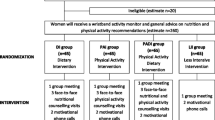Abstract
Purpose
The purpose of this study is to validate the Bodybugg (BB), a caloric expenditure measuring device, in breast cancer patients undergoing adjuvant and neoadjuvant chemotherapy for early-stage breast cancer.
Methods
Twenty-five women with stages I–III breast cancer who were to receive adjuvant dose-dense doxorubicin/cyclophosphamide were recruited. Participants were asked to wear the BB and record activity logs for seven pretreatment days (prior to commencing chemotherapy) and seven posttreatment days (upon completing cycle 4 of chemotherapy). The BB’s caloric expenditure measurements were used to calculate metabolic equivalent (MET) values of patients’ recorded activities. BB-calculated METs were compared with matching METs from the 2011 Compendium of Physical Activities Tracking Guide to assess accuracy of the device.
Results
The overall patient sample wore the device for an average of 5.32 (SD 1.75) pre- and 4.88 (SD 2.01) posttreatment days. The mean pairwise difference between BB and Compendium METs was 0.043 (SD 0.77) for 308 pretreatment activities recorded by 12 patients and 0.065 (SD 0.61) for 108 posttreatment activities recorded by 6 patients, indicating close to zero bias between the BB’s and Compendium’s measurements. Hierarchical linear modeling showed that Compendium METs strongly predict for BB METs (P < 0.00001).
Conclusions
The BB is feasible to use in study designs involving defined time periods of measurement and provides accurate and objective measurements of caloric expenditure in breast cancer patients.


Similar content being viewed by others
References
Cramp F, and Byron-Daniel J. 2012 Exercise for the management of cancer-related fatigue in adults. Cochrane Database Syst Rev. 11
Courneya KS et al (2013) Effects of exercise dose and type during breast cancer chemotherapy: multicenter randomized trial. J Natl Cancer Inst 105(23):1821–1832
Yabroff KR et al (2004) Burden of illness in cancer survivors: findings from a population-based national sample. J Natl Cancer Inst 96(17):1322–1330
Apex F. The science behind Bodybugg
Harris J, and Benedict F 1919 A biometric study of basal metabolism in man
Ainsworth B et al (2000) Compendium of physical activities: an update of activity codes and MET intensities. Med Sci Sports Exerc 32:498–516
University of South Carolina Arnold School of Public Health, P.R.C 2011 The 2011 Compendium of Physical Activities: Tracking Guide
Kiecolt-Glaser, J.K., et al 2014 Yoga’s impact on inflammation, mood, and fatigue in breast cancer survivors: a randomized controlled trial. Journal of Clinical Oncology
Furlanetto KC et al (2010) Step counting and energy expenditure estimation in patients with chronic obstructive pulmonary disease and healthy elderly: accuracy of 2 motion sensors. Archives of physical medicine and rehabilitation 91(2):261–267
Cavalheri V et al (2011) Energy expenditure during daily activities as measured by two motion sensors in patients with COPD. Respir Med 105(6):922–929
Andre, D., R. Pelletier, and e.a. J Farringdon, The Development of the SenseWear armband, a Revolutionary Energy Assessment Device to Assess Physical Activity and Lifestyle. . http://www.bodybugg.com/pdf/wp_accuracy_ee.pdf.
Cereda E et al (2007) Assessing energy expenditure in cancer patients: a pilot validation of a new wearable device. J Parenter Enteral Nutr 31(6):502–507
Dwyer TJ et al (2009) Evaluation of the SenseWear activity monitor during exercise in cystic fibrosis and in health. Respir Med 103(10):1511–1517
Johannsen D et al (2010) Accuracy of armband monitors for measuring daily energy expenditure in healthy adults. Med Sci Sports Exerc 42:2134–2140
Acknowledgments
This study was funded by TEVA/Cephalon Pharmaceuticals.
Conflicts of interest
A.H. is a consultant to Seattle Genetics and GTx and has received research funding from GlaxoSmithKline and Celgene. All other authors declare no conflicts of interest.
J.M. is a consultant for Puma Pharmaceuticals and received research funding from Novartis.
Author information
Authors and Affiliations
Corresponding author
Rights and permissions
About this article
Cite this article
Waliany, S., Dieli-Conwright, C.M., Frankel, P.H. et al. Validation and feasibility of a caloric expenditure measuring device in women with early-stage breast cancer. Support Care Cancer 22, 2329–2336 (2014). https://doi.org/10.1007/s00520-014-2212-5
Received:
Accepted:
Published:
Issue Date:
DOI: https://doi.org/10.1007/s00520-014-2212-5




